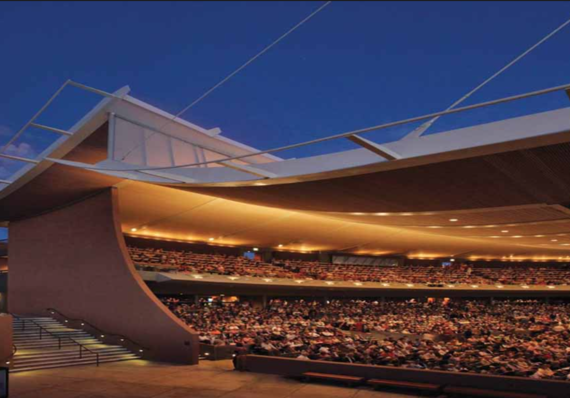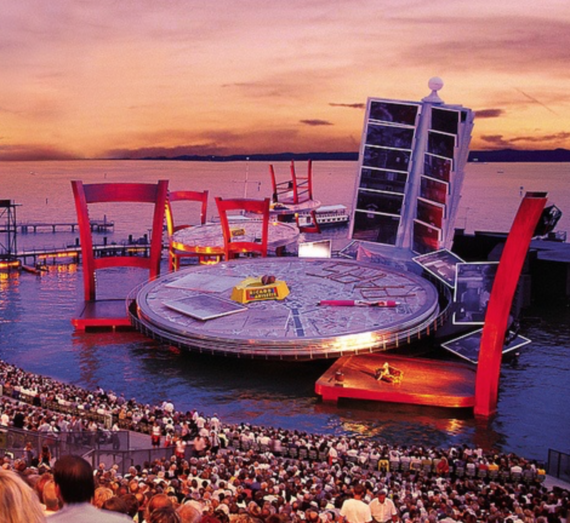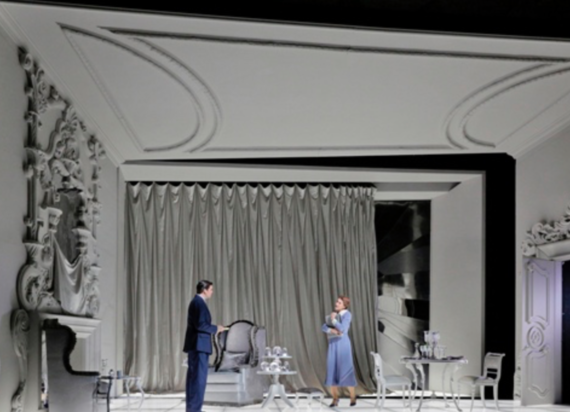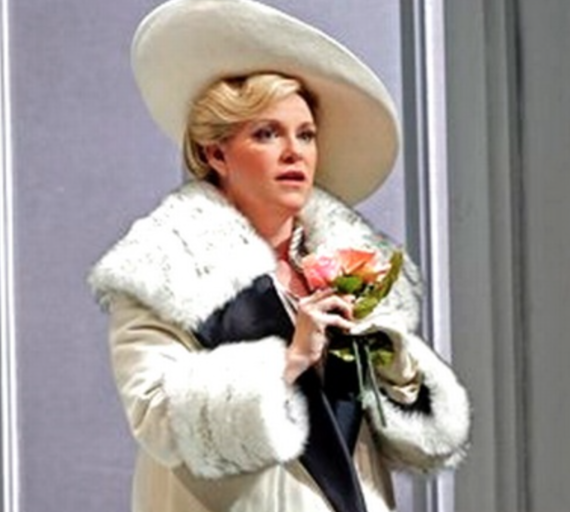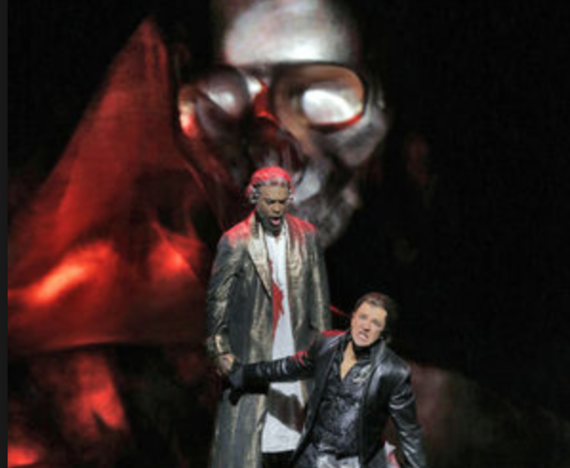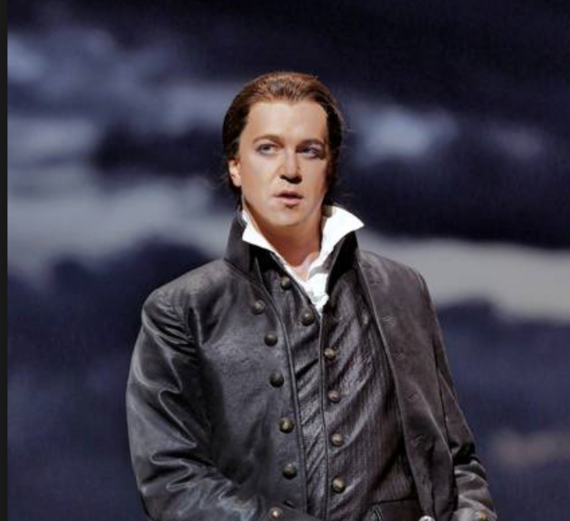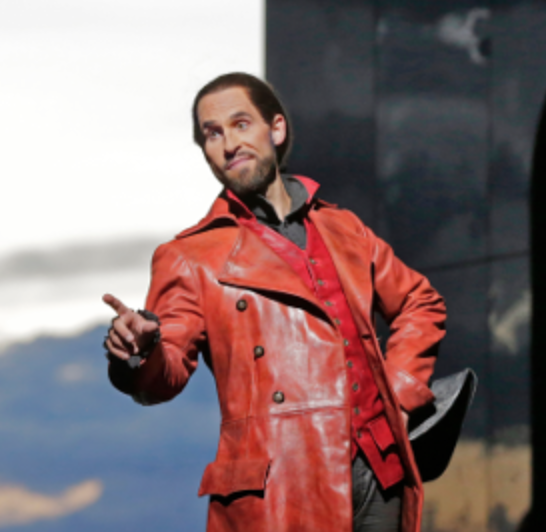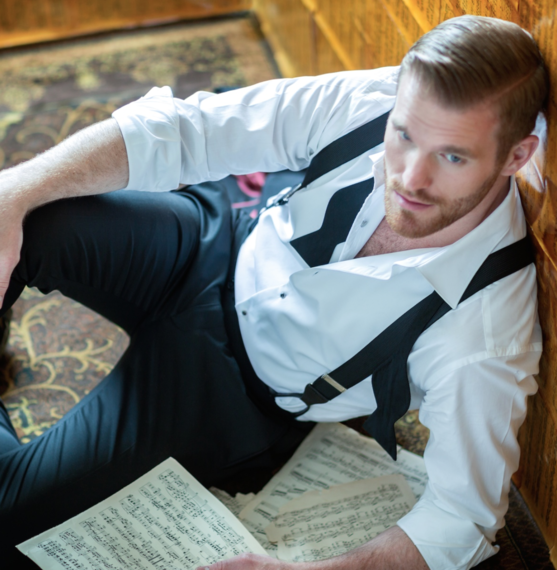If there is a better place to see opera during the summer than Santa Fe, I certainly don't know it.
While Glyndeborne in England may have been the first of the great summer festivals, and though it's glorious walking through the gardens, the organ room and trying to jump the ha-ha, their archaic rule about wearing black tie (or formal Highland wear -- and believe me, I look good in a kilt) is a bit annoying. Plus it's a three-hour schlep down from London, requiring both a train and a bus when your helicopter is in the shop; plus each production is interrupted by a two hour dinner intermission, which not only breaks the dramatic flow of the opera, but the restaurants there -- extremely expensive restaurants -- have questionable food at the very least. Imagine lots of indistinguishable brown meat garnished with over-cooked English vegetables, and try your luck elsewhere.
There is Bregenz, the theme park of summer opera festivals, where the show takes place on an enormous barge floating in the middle of an enormous lake, which reminds me of the Jones Beach productions I saw as a kid: each summer they did either The King and I (where the boat carrying the Kralahome was an actual boat) or Showboat, where the Showboat, was, well, a Showboat. Bregenz makes the Metropolitan look intimate. Hell, it makes the 20,000 seat Verona Arena look intimate! Also in Bregenz, there is always the eternal battle, a losing one, between we patrons and those viscous, giant, Austrian gnats.
Of course there's Salzburg, with it's lovely Goßes Festsphielhaus, the auditorium where Julia Andrews and her brood performed their last "So long, Farewell." I adore the town of Salzburg; how could you not? But you also have to put up with those nutty, de-constructivist European productions where Aida could just as easily be set on a Kibbutz as Mars.
No, it's the Santa Fe Opera for me, with its state of the art, happily-covered, outdoor theater, the perfect Santa Fe weather, and amazing singers right down to the youngest apprentice. (Joyce DiDonato started out as an apprentice there, so they can spot 'em.) Not to mention the city itself, with groundbreaking restaurants set cheek by jowl next to home-grown Mexican Tortilla shops and wonderful museums and galleries, coupled with the glorious high desert scenery and no humidity. The only downside is that the women (and men) wear a bit too much turquoise jewelry for my taste, but I can deal with that.
This season at the SFO was particularly wonderful; it was the first season in a few years that I wanted to see every single production. In the end, my schedule permitted me only two, but the two I saw were sublime, two of the best cast and best-staged shows I've ever had the pleasure to see. And so different.
I saw Vanessa, by Samuel Barber, first. Although I know the recording with Eleanor Steer, Rosalind Elias, Regina Resnick, and Nicolai Gedda very well, I had never seen a live production of this masterpiece. I was virtually panting to see it onstage.
Vanessa, a gothic country-house drama, concerns a forty-year old Miss Havisham-esque woman, the title character, who has waited twenty years, all too naively, for her former lover to return -- mirrors covered and all. The story opens with the sudden arrival of the man she thinks is her lover, but we quickly find out that the original paramour has died, and in his place comes his social climbing son hopes to take his father's place in Vanessa's heart and bedroom. Very creepy stuff, indeed!
The director James Robinson and his designer Allen Moyer transformed the enormous stage into a claustrophobic country house all decorated in heavy shades of grey. The creative team said they were inspired by Bergman's film Thirst and Crises, a film I've never seen, but want to immediately. This is the first time I've experienced the usually open back wall of the theater, with its panoramas of mountains deep in the distance, completely covered up. SFO's outdoor space was transformed into a traditional opera house stage, and the design was a complete success.
Of course, opera demands much more than a gorgeous set. It demands singers with great voices who can also act up a storm. This cast was simply astounding, down to the smallest part.
This particular opera sinks or swims on the casting of the essential trio: Vanessa, her younger sister Erica, (who at the conclusion takes Vanessa's place as a Miss Havisham to be) and Erica's grandmother. Erin Wall brought a desperate pathos to Vanessa, and when, in her self-delusion, she went off with Anatole fils, we could see her entire dismal future spelled out completely, her character was so utterly sympathetic and three dimensional. And boy, can she sing! Her soprano was fluid and versatile, completely at ease with Barber's challenging vocal lines.
Vanessa's sister Erica, Virginie Verrez, is a singer I had never heard live before, but can't wait until my next encounter. As Vanessa is on her manic roller coaster up, her sister is on the opposite track, moving from an innocent girl straight down to a personal hell. Erica has the daunting job of singing a standard "hit" aria within the first few minutes of the opera, a difficult task because of audience expectations. But Verrez delivered "Must the winter come so soon?" with such grace and longing, not to mention gorgeous phrasing and wonderful control, that the opera was kick-started into a plethora of emotions that didn't quit until the final curtain.
The final member of the family, the Baroness, was sung by Helene Schneiderman; she completely embodied the seen-it-all grandmother who, out of disgust, has stopped talking to her daughter. Her singing was formidable, but it was her stage presence that truly riveting. Even when she was merely sitting in a chair staring at the walls, I couldn't take my eyes off of her.
The final quartet of the opera, "To leave, to break," rivals the end trio of Der Rosenkavalier for sheer gorgeousness. An aside: I forgot how much Sondheim was influenced by this trio and not, as has been frequently suggested, the Strauss trio. After re-hearing this quintet, it's obvious what inspired the music to "Soon, Now, Later," in A Little Night Music.
I must mention that this opera has a Libretto by Gian Carlo Menotti in English, and that the language, which for some reason is a challenge even to native speakers, was completely and happily understandable. There was not a reason in the world for the "chair" titles because every word, every phrase was crystal clear. I feel strange congratulating the cast on perfectly enunciating their English, but given how seldom I've heard English sound like English and not some middle-European concoction coupled with a Klingon dialect, attention must be paid.
Don Giovanni was the direct antithesis to the "proscenium production" of Vanessa. This Don G embraced all of the magic of the Santa Fe Theater: a back wall open to the great vistas of New Mexico, easily doubling for Spain, the back elevator which brought up a golden, sculptural death mask of the Don during the overture and the stage's formidable underbelly as the Don was dragged to hell.
But not only was the set gorgeous, I don't think I've ever seen more nuanced performances given by an entire cast. Directors often get the big picture stuff right (most, that is)--after all, how hard is it to have the Don arrogantly not repent for his sins?--but this production had all the subtlety of a great movie. By this I mean that even though the audience is quite a distance away from the stage, I felt I was seeing the actors in extreme close-ups, every gesture, every glance, every look added to the three dimensionality of the characters. Kudos must go to Director Ron Daniels. He and his talented cast plumbed the very depths of Mozart's extraordinary score.
The show burst into energy as Daniel Okulitch bounded onstage after having happily raped Donna Anna. Okulitch, this month's cover boy on Opera News, is one of the treasures of the contemporary opera world. Not only is he completely at home in the standard repertoire -- I have seen him asFigaro, Almavia, Don G -- he is one of the go-to bass baritones for new music, having originated leads in The Fly, Brokeback Mountain, and JFK, to name a few. I feel that with this performance of the Don he is at the very height of his enormous powers. I've never seen -- and I've seen many -- a Don so elegant, so comfortable in his awful skin, so to the manor born, who, and most importantly, can still sing like a dream. As the cognoscenti know, in this opera Giovanni doesn't actually get any women except for Anna, when he also, oh by the way, kills Anna's father. I loved how bemused Okulitch seemed as each attempt at seduction went awry. Never mind, you could see him thinking: I have another 3000 girls at my fingertips. Onward and upward.
Then there is Giovanni's counterpart, his servant Leporello, played here by international superstar Kyle Ketelsen, who is probably the best Escamillo in the world right now. According to Mozart and daPonte, this is not a drama, but a comic-drama, and Ketelsen not only delivered a full-throated, resonate Leporello, but I've never seen as funny a performance, coupled with the truth of his lowly station in life.
One of the highlights of this production was the combination of Okulitch's and Leporello's voices. Even though they are both bass-baritones, the subtle differences in their colors blended effortlessly while still staying in the master/servant relationship, and it was always a pleasure to hear them sing together, with the Don clearly on the top! The two of them together were the perfect pairing for these two characters.
Elvira is one of the most difficult roles in the entire repertory, but supernova Keri Alkema delivered her seemingly impossible arias as easily as if she were singing "Twinkle, Twinkle, Little Star." Her power and her fluidity were astounding. It is quite astonishing that Alkema started as a Mezzo, hearing her navigate those treacherous soprano runs. Plus I loved the character she created. Elvira, in the hands of a less gifted artist, can often come off as a whiny, petulant, screeching caricature. Not here. This was a woman wracked with the pain of betrayal, not to mention that effortless coloratura. As Madam Ooglepuss of the Kuklapoitan Players (how's that for an archaic reference) would put it, Alkema is a coloratura-tura-tura!
Jarrett Ott is a wonderful, numbskull of a Massetto, with a sublime voice. He is at the early part of his career, but great things are just around the corner and I guarantee he's a superstar in the making. The sky's the limit. Last year, Ott was in the Young Artist Program here at Santa Fe but shot to international fame after having covered Nathan Gunn in Cold Mountain at Santa Fe last summer. He took over the part for its entire run at the Philadelphia Opera, where he received rave reviews. Santa Fe was lucky he was still committed to the Apprentice Program, and Ott's Massetto was the perfect foil to Don G and Leporello. I can't imagine a more perfect trio.
If I had a little quibble, it was with the orchestra, who seemed more comfortable playing the astringent Vanessa, than the standard repertoire of Giovanni. Without the death mask rising during the Overture, I wouldn't have gotten the eminent doom so perfectly voiced in those famous D minor chords. I wonder if it was an acoustical problem or simple a bit under-rehearsed. No matter. By the list song, all was perfect.
I wish I could have seen Capriccio, I wish I could have seen Roméo e Juliette with Ailyn Pérez and Stephen Costello, two of my favorite singers. And most of all I wish I had seen the divine Patricia Racette as Minnie in La Fanciulla del West. I've adored Racette as other Puccini heroines, Butterfly, Tosca, but given her ebullient and down to earth personality I'm sure her Minnie would have been equal if not better than her international triumphs in the more familiar Puccini heroines. (In fact, she lives in Santa Fe, so that cowgirl vibe is probably deep in her bones.)
But unfortunately, I had to get back to reality, New York City and life. Ah well. But I love Santa Fe, and before I left I called up a realtor. Who knows? Maybe next summer I'll be able to see the entire season.

